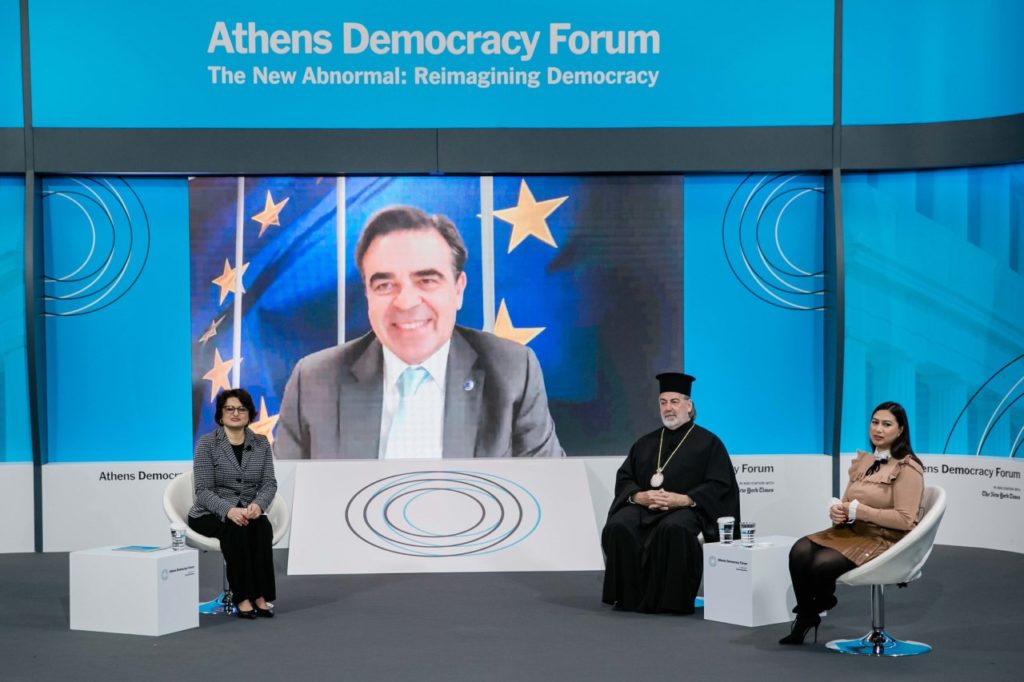The Athens Democracy Forum last week was themed “The New Abnormal: Reimagining Democracy.” The forum convenes in Athens to debate solutions to the world’s most pressing issues.
One of the panel discussions was labelled “The power of Belief”. Are religion and ideology obstacles or guiding lights in a democracy? Three panellists participated in the discussion: Margaritis Schinas, Vice-President of the European Commission for Promoting our European Way of Life, Archbishop Nikitas, Greek Orthodox Archbishop, and Fatima Zaman, an advocate from the Kofi Annan Foundation.
On the one hand, religions can be powerful forces for good in the pursuit of higher morals, in the care for the poor, in the promotion of civil society. The moral and ethical principles of liberal democracy derive from religion, and shared identities can give people a sense of community and purpose.
On the other hand, religion and, more recently, identity politics can also be forces for coercion, abuse of the weak, terror, intolerance and war. Where is the balance in the modern world?
Asked about his message to the listeners, the Archbishop replied that “we have to listen carefully to what God says”. That can be difficult and believers through history have often confused his voice with their own inner voices. In practice, Archbishop Nikitas asks himself how Jesus would have acted in his position. The point is to live according to the same core value system as Jesus embraced according to the Bible.
Fatima Zaman described herself as modern Muslim woman. “Religion is a force of good but it can also be politicized and misused to justify violence.” She acknowledged both sides of religion and advocates inter-faith dialogue to promote mutual understanding and tolerance.
The EU does not want to be looked upon as a “Christian club”. For Vice-President Margaritis Schinas, the starting point is the EU treaty which includes an article (17) on the dialogue between the European institutions and religious associations or communities as well as philosophical and non-confessional organisations.
In the past, Europe suffered of divisions and wars, often fueled by religion. He described the EU as an epicentre of peaceful existence with a mix of identities and common values. “It’s not us against them any longer. Europe is a mirror of different religions and cultures.”
But what about the dark spots in the mirror, the Holocaust in WWII, and antisemitism, islamophobia, racism and xenophobia today? Schinas recognized the rising trend of racism in the EU. “We don’t tolerate it and are fighting it in different ways. The best antidote against the voices of racism is good policies.” Last month, the European Commission presented an action plan against racism.
Archbishop Nikitas was worried about the violence religious communities are facing in Europe. “We fear other communities because of lack of understanding of them. Bricks can be used to build either walls or bridges between us.”
“Where in the world do you feel more protected than in the EU?” Schinas asked. The other two panelists were less convinced that the EU is a world champion of human rights. There is intolerance everywhere in the world, including the EU. “Religious leaders must take the lead to improve the world,” the Archbishop concluded. “It all comes down to truth and love.”
Since 2009, the dialogue with religions, philosophical and non-confessional organisations is enshrined in the Lisbon Treaty. A source in the European Commission describes the dialogue as a structured dialogue aiming at giving religious communities the possibility to express their opinion on EU policies and influence the Union. For that end high-level meetings are organised on all possible topics.
M. Apelblat
The Brussels Times

